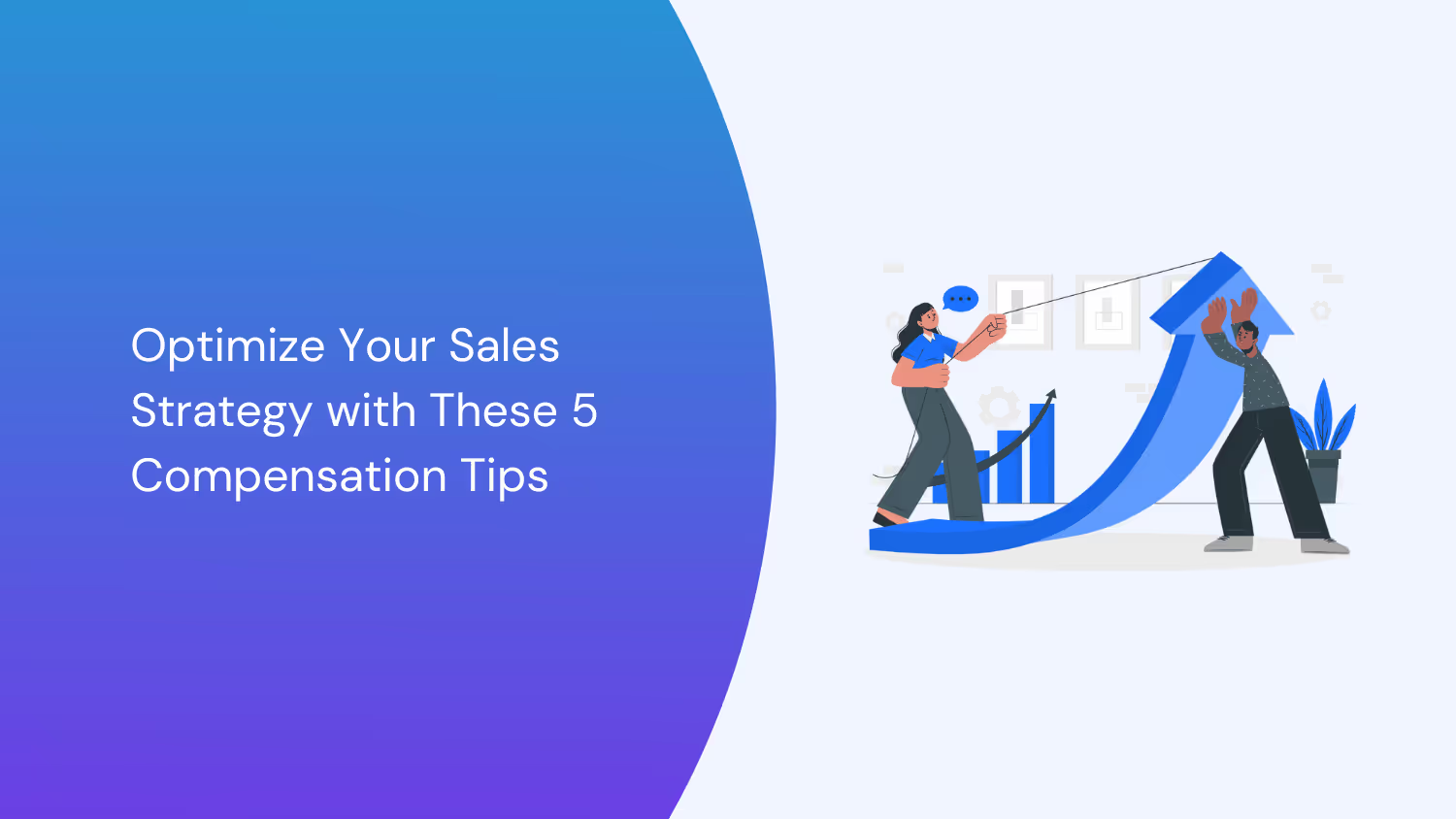5 Sales Compensation Best Practices To Set You Up For Success In 2025

As we dive further into the year, what are some of the learnings that you've been able to incorporate into your sales compensation strategy for 2025?
Simply having a sales compensation plan that “no one is complaining about” is not enough. Sales teams need a plan that goes beyond just providing compensation and incentives to motivate them. From aligning incentives with business goals to fostering a motivated and high-performing sales culture, this blog post delves into the crucial best practices that will keep your organization ahead of the curve in 2025.

3 Reasons Sales Compensation Matters for SaaS businesses
Reason #1 - Sales Compensation is one of the biggest costs to a company.
Reason #2 - Sales Compensation impacts sales motivation, performance, revenue growth, and profitability.
Reason #3 - Sales Compensation enables companies to hire and retain top sales talent. It influences selling behavior and sales culture.
Companies need to evolve along with the changing business landscape to take on fresh challenges and make their sales compensation plan timely, accurate, and transparent.
5 Sales Compensation Planning Best Practices To Swear By
1. Make sure your sales compensation plan is aligned with your business goals and strategy
An aligned sales compensation plan ensures that all stakeholders are working towards the same objectives and that the company can achieve its goals most effectively and efficiently as possible.
To align your sales compensation strategy with your business goals, ask yourself, “What do you want to achieve and how can your compensation plan help support those goals?” Now, jot down your top 3 goals such as revenue growth, new market expansion, or enhanced customer satisfaction. Now that you have your top priorities underlined, map how your sales compensation plan could help you achieve your goals faster. Let your business and sales strategy drive your compensation plan, and not the other way around.
If a sales compensation plan is not aligned with a company's business goals and strategy, it can impact salespeople who may not be motivated to pursue the same goals as the company due to inadequate compensation which eventually leads to a decline in sales. In the long run, this may result in decreased employee satisfaction and a higher turnover rate.

🔔 Must Read: How to build a sales compensation plan that fits your unique SaaS needs
2. Communicate your plan clearly and transparently to your sales team
Make sure to consistently communicate your sales plan to your sales team so they know what they need to do, and how much is at stake. Also, keep evaluating the plan because the change in the plan is necessary to incentivize the right behaviors. If your reps don’t understand how they will be paid, then it is very hard to use compensation to motivate them to perform their best.

To communicate your sales compensation plan clearly and transparently to your sales team, you should first make sure that the plan is well-designed and easy to understand. This means outlining the specific behaviors and actions that will be rewarded, as well as the criteria for earning commissions or other incentives. Also, use visual aids, such as diagrams or graphs, to make the plan easy to understand and interactive.

Finally, make sure to answer any questions or concerns that your team members may have about the plan, and be open to feedback and suggestions for improvement.
3. Focus on incentivizing the right behaviors
Now that clear communication is in place, it is pivotal to think out of the box when it comes to rewarding your top sales performers. The right sales compensation plan rewards behavior such as building relationships with key customers, identifying new business opportunities, and efficiently closing deals, always keeping your sales team motivated.

Find different ways to incentive your employees, either through commissions or other means. While traditional incentive methods such as SPIFFs, bonuses, and kickers are all great ways to keep your team motivated, there’s so much more that could drive higher engagement. Here are some non-traditional sales incentive ideas to try:
- Gift Cards
- Subscription-based packages (Netflix and Chill?)
- Membership-based services (Gym, Food Delivery, etc.)
- Courses or learning opportunities for upskilling.
- Gadgets of their choice (AirPods, Coffee machine, etc.)

Incentivizing the right behavior is mission-critical to retain those sales rockstars, and keep them motivated to maintain the best relationships with customers and close deals efficiently.
🔔 Must Read: Mastering Sales SPIFFs: A Comprehensive Guide for 2025
4. Establish clear and quick payment terms
Sales commissions are paid every quarter i.e. four times a year and once in three months. Companies avoid monthly payments as it is a very cumbersome process and it takes almost 2-3 days to compile all data and circulate it to all the sales reps.
Only a few businesses across the globe use technology to streamline and automate this commission payment process, ensuring accurate and on-time payments. Adopt a model that makes it easy for your sales team or contractors to understand when and how they will be paid their commissions. This helps prevent misunderstandings and ensures that everyone is on the same page.
The key is to maintain a relationship of trust and transparency with your team and contractors.
Again it is very crucial to communicate the compensation plan with the reps. Companies can organize a small meeting to discuss the entire plan and answer all the questions and confusion. This way each and every sales rep will have the same idea about the compensation and there will be no confusion.
5. Show commission progress in real-time
Salespeople may be less motivated to pursue sales if they are not able to track their progress in real-time. This can lead to a decline in productivity and revenue generation. It is, therefore, pivotal to show your sales team how their efforts are contributing to their overall compensation.

Closing deals based on sales compensation is just not enough, reps need to make sure that their work is being evaluated by their superiors. That’s where the leaderboard comes in, with all the automation in the plan taking place, companies also use the leaderboard to evaluate performance.
By using sales compensation management software, reps can easily take feedback in real-time from the sales head. This saves a lot of time that companies mostly spend in organizing the meeting to review performance individually.
.avif)
This helps build trust in the long run and encourages your sales team to continue working hard. Also, it can help ensure that they are meeting their sales targets and contributing to the success of your business.
On the other hand, if your reps feel demotivated due to unfair compensation practices or lack of transparency in their commission plan, this may result in a high turnover rate and gravely impact the company's reputation. This could, in turn, lead to a strained relationship between the sales team and other stakeholders.
In conclusion, in 2025 and beyond, any company's long-term performance will depend heavily on adopting efficient sales compensation policies. Businesses may motivate and retain their top sales performers while also driving revenue growth by adopting a strategic strategy that takes into account elements like performance measurements, team collaboration, and incentive structures.
If you want to keep your compensation plans in line with your business objectives and reflective of the demands of your evolving sales force, you need to review and update them on a regular basis. By adhering to these five guidelines, companies can increase their chances of future success and expansion.
FAQs
What is the best way to compensate sales representatives?
The best way to compensate sales representatives involves a mix of competitive base salaries and performance-based incentives like commissions or bonuses. Aligning compensation with business goals, offering recognition, and providing opportunities for career growth also contribute to motivating and retaining top-performing sales professionals.
What makes a good sales compensation plan?
A good sales compensation plan aligns with business goals, motivates sales teams, and ensures fairness. It balances fixed and variable components, provides clear performance metrics, and adapts to changes in the business landscape, fostering a high-performance sales culture while driving sustainable revenue growth.
What is the most common sales compensation structure?
The most common sales compensation structure combines a fixed base salary with variable components such as commissions or bonuses based on sales performance. This hybrid model motivates sales teams with a stable income while rewarding them for achieving or exceeding sales targets.
What is a 70-30 salary split?
A 70-30 salary commission split refers to a compensation structure where 70% of a sales representative's earnings come from a fixed salary, and the remaining 30% is derived from variable components like commissions or bonuses, creating a balance between stable income and performance-based rewards.
What is 80-20 sales compensation?
In an 80-20 sales compensation model, 80% of a sales representative's earnings come from a fixed salary, providing stability, while the remaining 20% is derived from variable components such as commissions or bonuses, offering incentives tied to performance and sales achievements.
What is 60-40 sales compensation?
In a 60-40 sales compensation model, 60% of a sales representative's earnings come from a fixed salary, ensuring stability, while the remaining 40% is derived from variable components like commissions or bonuses, providing incentives tied to individual and team sales performance.

.webp)

.webp)

